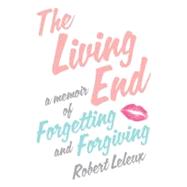
ROBERT LELEUX teaches creative writing in the New York city schools. His nonfiction pieces have appeared in The New York Times Magazine, Texas Observer, and elsewhere. He lives with his husband, Michael Leleux, in Manhattan.
"The Living End is Robert Leleux's exceptionally moving
memoir about his beloved grandmother and his heroic caring for her as
she slipped into the grip of Alzheimer’s. The book is at times
hilarious, tender, and heartbreaking--further proof that Mr.
Leleux is ripening into one of the best prose stylists in
America." --Pat Conroy
"Robert Leleux sets off on a journey that will be familiar to many Baby Boomers - watching a beloved elder painfully slipping away - but his version of the tale is singularly bittersweet, funny, and empathetic. It's a rare thing to find a memoir of illness that can be described as cheerful, but this one is that - and much more."- Mark Childress, author of Georgia Bottoms and Crazy in Alabama
"Robert Leleux's hilarious and poignant memoir of his fractured family takes an unexpected, wholly satisfying turn at the end: as lives ebb, memories fail, and long-withheld loves emerge." --John Berendt, author of Midnight in the Garden of Good and Evil and The City of Falling Angels
“Not many people are able to find a silver lining in Alzheimer's, and few writers are gifted enough to make you see it and believe it. Leleux relates his family's story with love, humor, and hope.”--Margo Howard, "Dear Margo" columnist
"What immediately came to mind on reading "The Living End" was that is was very much like a modern day retelling of Auntie Mame by Patrick Dennis, one of my favorite books of all time. I laughed, I cried, I lived this story and am a better person for it!
You will never forgive me if you don't read this book and you will never forget the author, Robert Leleux either. Leleux reminds us that the magic of our relatively short time on earth, only exists in a world of forgetting and forgiveness! I believe that Auntie Mame herself would have put her STAMP OF APPROVAL on this book as I have too!"--Kathy L. Patrick, Founder of The Pulpwood Queens Book Clubs
“This spare, extraordinary book by turns splits the sides and breaks the heart, but it is the healing vibration of laughter you're left with -- what comes when one sees existence whole and luminous, and with it the daunting logic of human love.”-Honor Moore, Author of The Bishop's Daughter
"In a wonderfully engaging heart-of-the-matter voice, Robert Leleux chronicles his chic Texas grandmother's descent into the gloom of Alzheimer's. He is circumspect in recording the many indignities the disease brings and equally faithful to praise the joys of a happy marriage, of good wigs and zinger punch lines. Leleux's writing is as bright and elegant as one of his grandmother's hats, his love of family and faith in their enduring strength a rare and refreshing thing." --Janis Owens, author of The Schooling of Claybird Catts
"Robert Leleux tickles his way to triumph yet again. With his trademark wit and colorful southern charm, The Living End transforms Alzheimer's from a disease associated with loss into a blessing of myriad gain."--Josh Kilmer-Purcell, author of I Am Not Myself These Days and The Bucolic Plague
"The Living End is as funny as it is heartfelt. Robert Leleux is among the great emerging talents of his generation; I'm bowled over by the beauty of his writing."—Sarah Bird, author of The Yokota Officers Club and The Gap Year
"The Living End is terrific! I could not stop reading this family journey of loss, hope and redemption. With humor and poignancy, Robert Leleux does a magical job of capturing the beautiful and often complex relationship between grandparent and grandchild."--Michael Morris, author of Slow Way Home
"A fascinating Southern tale of an estranged mother and daughter — and the unlikely fate that brings them together. Affably narrated by Robert Leleux, a man who loved both women, The Living End is a touching reminder that, ultimately, we are not defined by our memories. But our commitments to dwelling on the past and resentments can keep us from becoming the person we want to be. Even for those we love the most."--Neil White, author of In the Sanctuary of Outcasts
The New copy of this book will include any supplemental materials advertised. Please check the title of the book to determine if it should include any access cards, study guides, lab manuals, CDs, etc.
The Used, Rental and eBook copies of this book are not guaranteed to include any supplemental materials. Typically, only the book itself is included. This is true even if the title states it includes any access cards, study guides, lab manuals, CDs, etc.